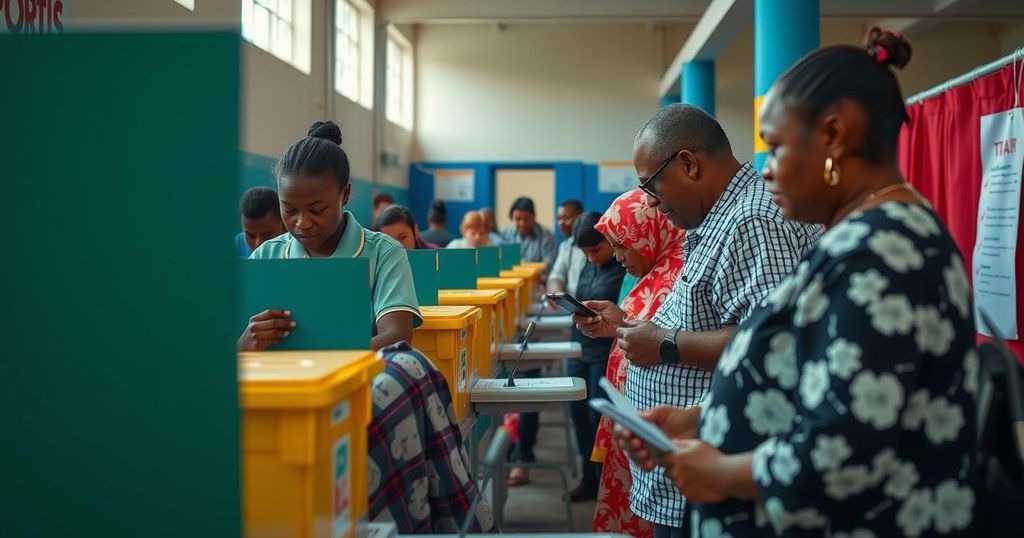World news
AFRICA, AFRICAN UNION, ALLIANCE OF CHANGE, BRITAIN, CHAGOS ISLANDS, DEMOCRACY, DEMONSTRATIONS, GOVERNMENT, INDIAN OCEAN, MAURITIUS, MILITANT SOCIALIST MOVEMENT, NATIONAL ASSEMBLY, NAVIN RAMGOOLAM, OPPOSITION, POLITICS, POPULISM, PR, PRAVIND JUGNAUTH, RAMGOOLAM, SHEILA
Fatima Alavi
0 Comments
Mauritius Votes Amidst Political Turmoil and Phone-Tapping Scandal
Mauritius conducted a parliamentary election amidst a scandal involving leaked conversations of key politicians and diplomats, raising concerns about civil liberties. The election followed an agreement on the sovereignty of the Chagos Islands, which added complexity to the political landscape. Prime Minister Pravind Jugnauth faces competition from former Prime Minister Navin Ramgoolam, with both promising economic improvements. Turnout was reported at 70 percent, with significant scrutiny over election integrity.
On Sunday, Mauritius participated in a closely contested parliamentary election that centered on maintaining economic and political stability within this affluent African democracy. This election followed a landmark agreement in which Britain agreed to transfer sovereignty of the Chagos Islands to Mauritius, a long-standing contention that has characterized their diplomatic relations. Incumbent Prime Minister Pravind Jugnauth’s path to re-election was complicated by a significant scandal involving leaked recordings of private conversations from politicians, diplomats, and journalists, which surfaced online prior to the election. In an attempt to manage the backlash from the scandal, Mauritian authorities imposed a temporary ban on social media until after the elections, only to retract this decision amid mounting pressure and criticism from opposition parties and the media. This incident has raised alarm about the potential erosion of civil liberties and democratic principles in the nation. The electoral battle unfolded between Jugnauth’s Militant Socialist Movement coalition, which holds a majority, and the Alliance of Change, led by former Prime Minister Navin Ramgoolam, both factions promising to alleviate poverty and reduce living costs for their constituents. Polling stations witnessed a turnout of 70 percent one hour before closing, as reported by the electoral commission. A police presence was established at these locations to ensure a secure voting process, with observers from entities such as the African Union overseeing the elections. Ramgoolam expressed concerns regarding potential electoral fraud, yet later noted that voting proceeded without significant issues. “We are heading towards a big victory tomorrow. The people are waiting for this liberation,” he declared. Conversely, Jugnauth expressed confidence in his administration’s achievements, stating, “We are confident of winning because the people appreciate our record,” and accused the opposition of attempting to disrupt the electoral proceedings. As registered voters exceeded one million for this twelfth election since independence in 1968, the implications of the political landscape remained focal points for analysis. Voter sentiments reflected worries over the nation’s economic and political stability amidst growing concerns regarding governance. The majority Hindu population of 1.3 million has witnessed considerable development, transitioning to an economy largely dependent on tourism, finance, and textile sectors. However, analysts assert that there is a pressing need for economic diversification alongside awareness of governance issues, particularly as corruption has seemingly escalated. The leadership of Mauritius has predominantly rested in the hands of three families since its independence, with both Jugnauth and Ramgoolam being descendants of the nation’s inaugural leaders. Challenges have emerged against established political figures, as seen with the Linion Reform alliance’s campaign that criticized prevalent corruption and nepotism in the political system. Notably, while the government heralded the Chagos agreement as a significant achievement, apprehensions lingered regarding the continued US military presence in the region under the existing lease with Britain.
Mauritius, situated in the Indian Ocean, is characterized by its robust democratic traditions and economic prosperity, which has been carefully cultivated since it gained independence from Britain in 1968. The country prides itself on its peaceful transition of power and stability, which contributed to significant economic growth, particularly in tourism and manufacturing sectors. However, recent events, including the phone-tapping scandal and concerns over governance, have cast a shadow over its democratic standing. The electoral process is of particular interest amid debates about the true nature of democracy in Mauritius, especially given the challenges faced by oppositional voices and the historical context of political leadership that is largely dynastic.
The parliamentary elections in Mauritius unfolded against a backdrop of political strife and public discontent over governance. While promised reforms to address socioeconomic issues were highlighted by the competing parties, concerns regarding civil liberties and the integrity of the electoral process loom large. The ramifications of recent scandals, combined with a historically entrenched political culture, pose challenges to the nation’s democratic foundations and its future trajectory. As results are awaited, the implications of voter turnout and party confidence will significantly influence subsequent governance and reforms in this important African nation.
Original Source: www.guampdn.com




Post Comment